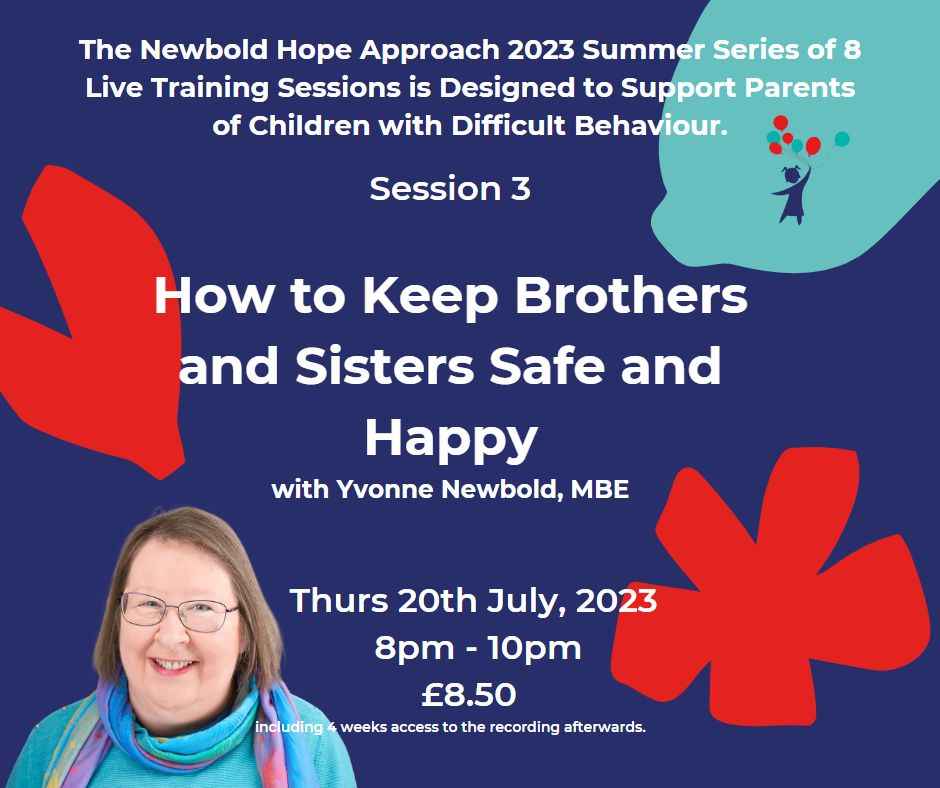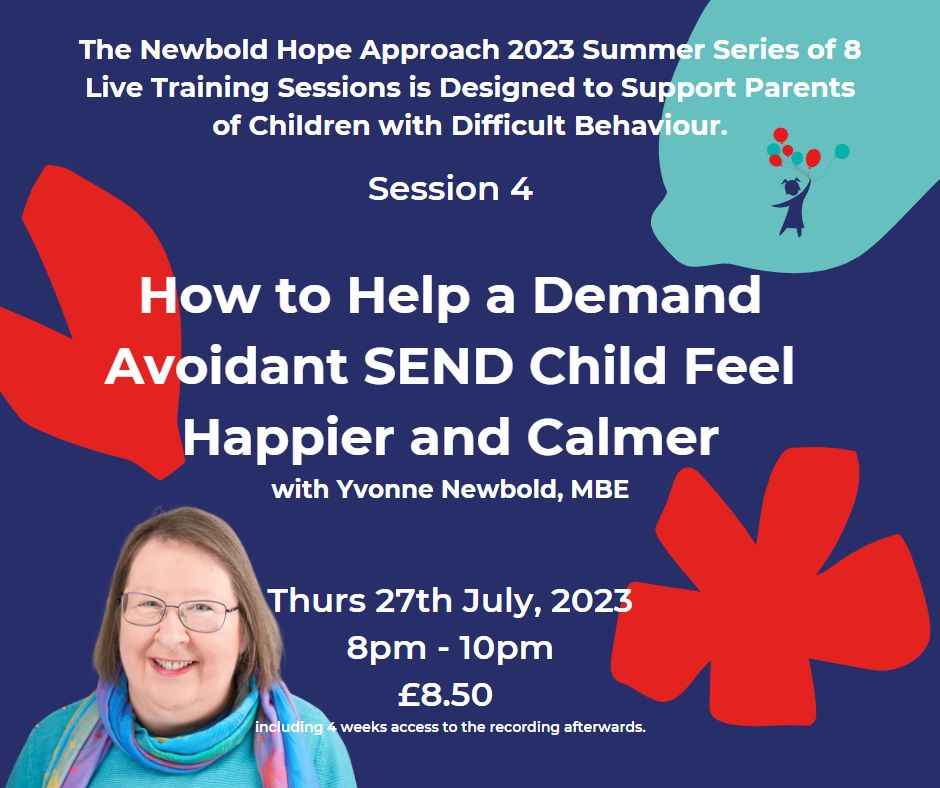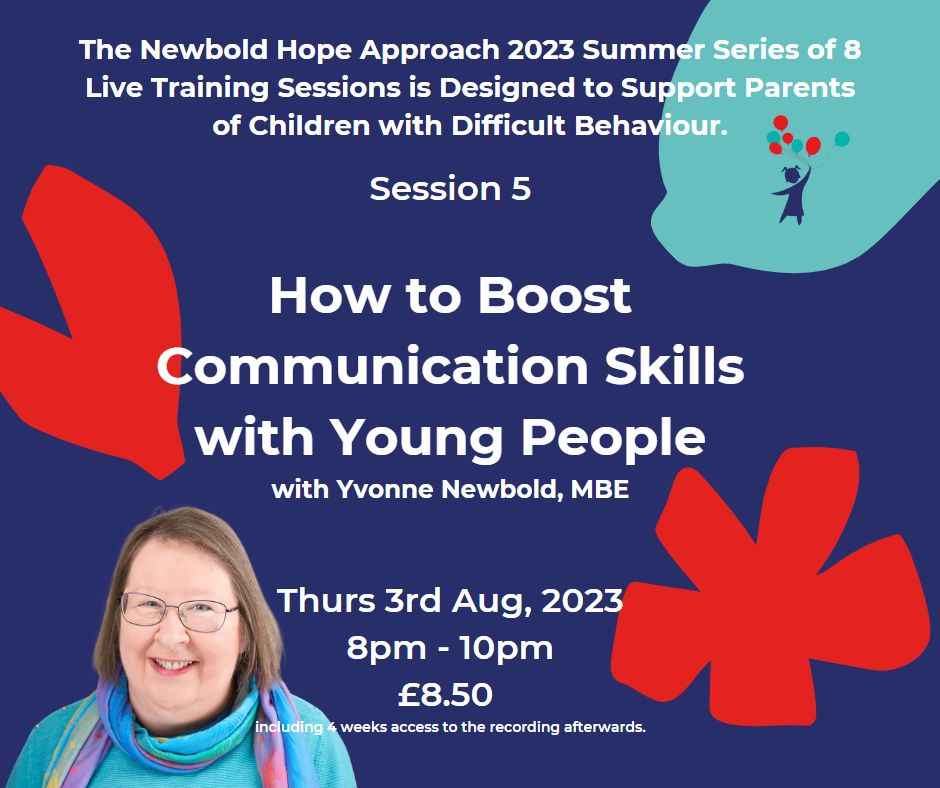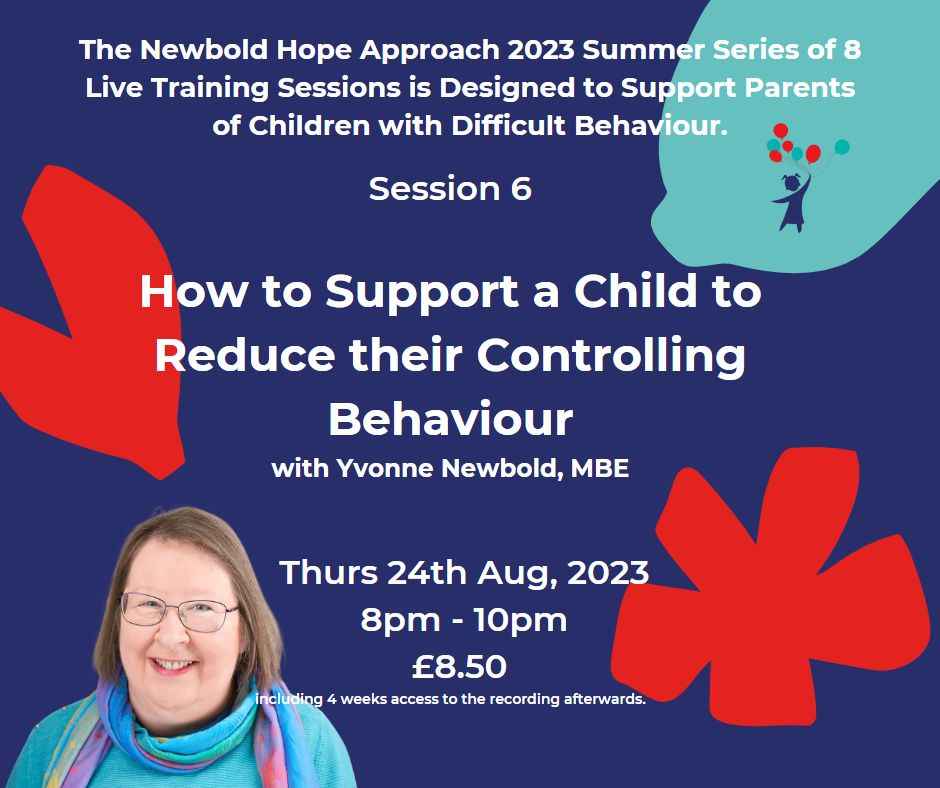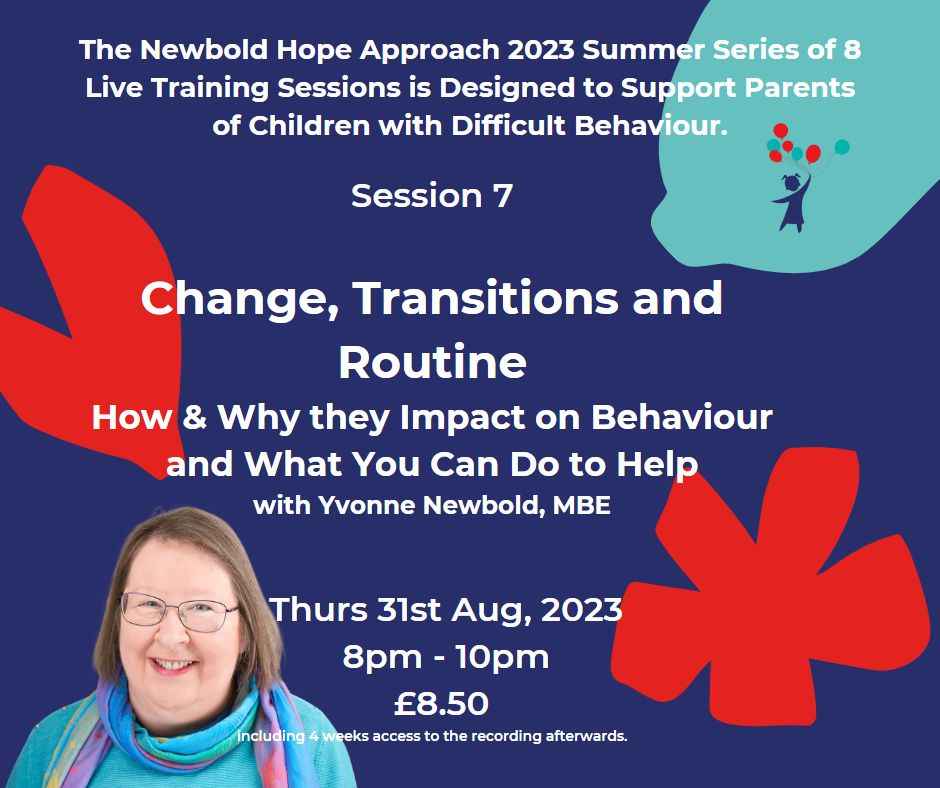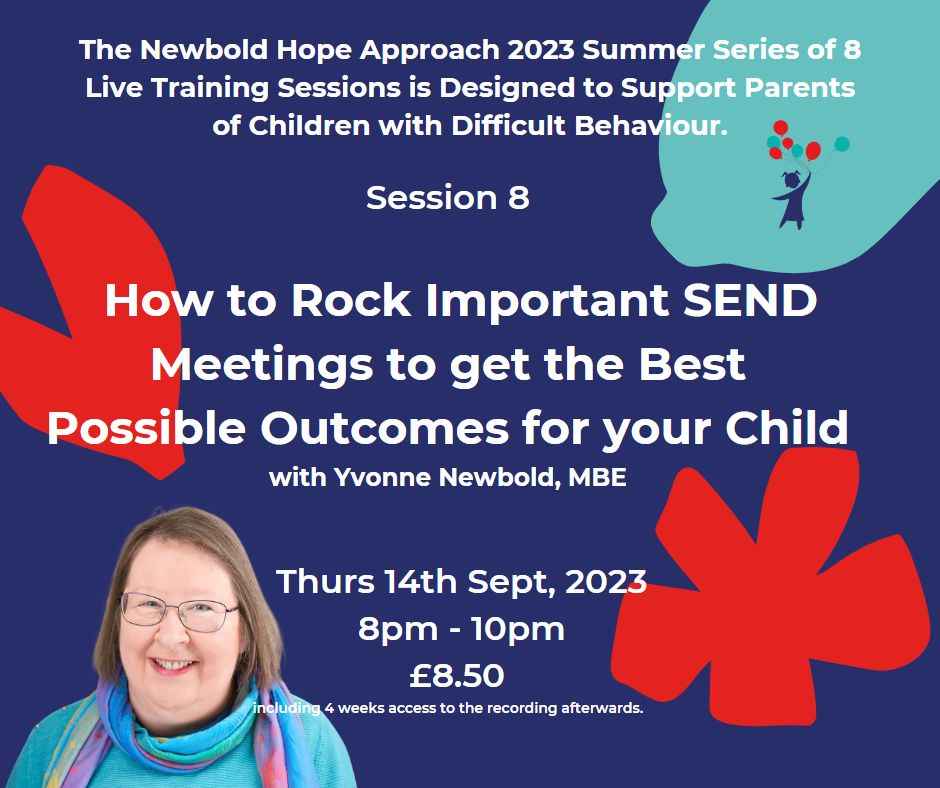Newbold Hope
We are delighted to invite you to join our Newbold Hope Live Online Training Sessions about Childhood Distressed Behaviours
with Yvonne Newbold, MBE
The Newbold Hope Approach 2023 Summer Series of 8 Live Training Sessions is Designed to Support Parents of Children with Difficult Behaviour.
Session 1 - Thurs 6th July
8pm - 10pm
£8.50 with 4 weeks access to the recording afterwards
THIS SESSION HAS ALREADY TAKEN PLACE BUT YOU ARE ABLE TO BUY THE RECORDING. JUST CLICK ON THE LINK BELOW.
How to Support your Child when they Struggle to Attend School.
Recording Summer 23. 1 School Attendance
What do you do when your child or young person becomes distressed at the thought of going to school? What happens when they simply cannot attend? It may be that they can’t face school for a day or so here or there, or they may stop going for weeks or months. What if it doesn’t look like you’ll ever get them back through the school gates?
This is an issue that is affecting thousands of families all over the country. It's an incredibly emotional issue that’s shrouded in shame, but seldom discussed and often ignored and swept right under the carpet. When it does get talked about, more often than not the parents are blamed and the children may be seen as trouble-making delinquents.
There’s so much more behind the reasons why children and young people may develop an inability to go to school, but most people can’t see the real reasons why. If it happens to your child, chances are you’ll feel lost, out-of-your-depth and as if you are somehow failing as a parent. Yet it’s very seldom a parent’s fault and it’s highly unlikely to be the child’s fault either.
This live online webinar is a joint project between Newbold Hope and Not Fine In School, two parent-led organisations which both support parents when things are extremely difficult due to difficult or dangerous behaviour or with school attendance. Yvonne Newbold MBE will lead the session which takes a realistic view of what’s really going on, why it’s so poorly understood, and what you can do to support your child in the best way possible. It’s packed with workable strategies and ideas that can really help to make things better.
Here are just some of the topics we’ll be looking at -
- Who are the stakeholders – the important players – when a child can’t attend school?
- How do each group of stakeholders view non-attendance
- What does this mean for children and their families?
- What are parents often told to do?
- The law regarding school non-attendance
- What works and what doesn’t
- What’s really going on?
- What you can do to help
- How to get other stakeholders onside
- Where to seek help
- How to counter parent-blame
- How to best support your child
- Top tips to get through this
Please click on this link to buy the recording:
Session 2 - Thurs 13th July
8pm - 10pm
£8.50 with 4 weeks access to the recording afterwards
THIS SESSION HAS ALREADY TAKEN PLACE BUT YOU ARE ABLE TO BUY THE RECORDING. JUST CLICK ON THE LINK BELOW.
Recording Summer 23. 2 - School Holidays
The school summer holidays are supposed to be a time to be together as a family making precious childhood memories and having lots of fun. However, for many families who have a child with a disability or an additional need who can sometimes get so anxious that they behave in dangerous or difficult ways with very extreme behaviour, those long weeks ahead can be filled with apprehension or even dread.
The focus of this webinar is on parent and child emotional well-being, and it’s full of practical ideas and suggestions that can make family life easier and seem much more doable so that things are happier and calmer for everyone at home.
Please click on this link to buy the recording:
Session 3 - Thurs 20th July
8pm - 10pm
£8.50 with 4 weeks access to the recording afterwards
THIS SESSION HAS ALREADY TAKEN PLACE BUT YOU ARE ABLE TO BUY THE RECORDING. JUST CLICK ON THE LINK BELOW.
How to Keep Brothers and Sisters Safe and Happy
This session gives parents a chance to step back and look at their own family dynamic and examine what works well and what works less well.
During the two hours, the webinar covers sibling rivalry, conflict, communication, resentments, feelings of unfairness, parental guilt and worry and how this can influence a parent’s ability to handle situations as they arise, and possible emerging mental health concerns in children.
It is packed full of strategies to encourage better relationships between brothers and sisters, regardless of any additional needs. It also looks at how to prioritise safety which includes how to design a safety plan, how to explain about a child’s additional needs to the other children in the family and how to ensure that every child knows that they are valued, loved, and treated fairly.
This session is extremely popular with parents who often carry significant levels of fear and stress about the effect of difficult behaviours on their other children, and they leave with practical and doable strategies that they can try straight away.
Session 4 - Thurs 27th July
8pm - 10pm
£8.50 with 4 weeks access to the recording
THIS SESSION HAS ALREADY TAKEN PLACE BUT YOU ARE ABLE TO BUY THE RECORDING. JUST CLICK ON THE LINK BELOW.
How to Help a Demand Avoidant SEND Child Feel Happier and Calmer
This webinar looks at why children who are very anxious can also become markedly demand avoidant, and how you can support these children to cope better with everyday life.
We start by looking at: –
- What does “demand avoidant” mean?
- Why, if a child avoids demands, it does not necessarily mean that they would always meet the criteria for a diagnosis of autism with demand-avoidance traits, or of Pathological Demand Avoidance, which is commonly abbreviated to PDA.
- Why children sometimes become demand avoidant.
- The link between demand avoidance and anxiety
- How to identify and address the underlying causes of this anxiety
- Effective strategies that can help are shared from the very start and all the way through.
This webinar explores in depth some of the possible underlying reasons behind the anxiety that is likely to be causing any demand avoidance, and what a parent can do to minimise this anxiety by addressing the root cause. We also discuss how lowering demands can be helpful as a short-term strategy, but it is seldom the whole answer, and long-term it becomes unrealistic and unsustainable.
We look at some common difficulties such as school refusal or bedtime refusal, masking, and how demand avoidant behaviour can sometimes tip over into controlling behaviour. We look at how to use visuals to aid understanding and communication when emotions are heightened, and the importance of giving a child far more time than seems necessary to allow them to process information.
We also look at why praise can be difficult for children whose anxiety levels have become so extreme that they are using demand avoidant behaviour to cope with daily life. Plus loads more.
Parents leave this workshop feeling lighter, more hopeful, and optimistic, less alone, and with a fresh approach towards supporting their child.
Session 5 - Thurs 3rd Aug
8pm - 10pm
£8.50 with 4 weeks access to the recording
THIS SESSION HAS ALREADY TAKEN PLACE BUT YOU ARE ABLE TO BUY THE RECORDING. JUST CLICK ON THE LINK BELOW.
How to Boost Communication Skills with Young People
When there have been difficult behaviours present for a number of years, often the child-parent relationship inevitably suffers as a result, which means that the lines of communication are significantly reduced and any attempt to communicate may result in defensiveness or aggression. This webinar is full of tips, tricks, and strategies to re-establish connection with your child through communication. It also explores the most common communication impairments in children with additional needs and how to identify if and where your child may be struggling to communicate.
Among other things, this webinar will cover: –
- The differences between expressive and receptive communication and how they are quite different skills.
- 10 different methods of communication that we nearly all use
- How all behaviour is a form of communication
- How communication issues can lead to behavioural episodes and how to counter them
- Common communication issues in SEND children and how to address them.
- Rigid thinking and inflexibility, the problems this can cause and how to overcome them.
- The importance of regulating our own tone of voice and how to do that even when emotions are becoming heightened.
- Why “no” can be a trigger word and what to say instead.
- Why talking about feelings is so hard for children and what to talk about instead.
- Alexithymia
- And lots more
Throughout this and all the webinars there are tips, tricks and strategies that can all be put into practice straight away. You will leave this webinar feeling more confident about being able to identify and support your child’s communication needs, with the skills and tools you need to build towards establishing a better quality of communication with your child and your whole family.
Session 6 - Thurs 24th Aug
8pm - 10pm
£8.50 with 4 weeks access to the recording
THIS SESSION HAS ALREADY TAKEN PLACE BUT YOU ARE ABLE TO BUY THE RECORDING. JUST CLICK ON THE LINK BELOW.
How to Support a Child to Reduce their Controlling Behaviour
Children who use controlling behaviour is a common issue that affects a large proportion of families coping with other forms of extreme behaviour. It is a very stigmatising issue, which is very emotional and shrouded in secrecy and shame. It is very seldom discussed, and one of the strengths of this webinar is how validated people feel when they realise that they are not alone, and that this topic is being discussed openly. This session looks at the underlying reasons for this controlling behaviour, and how parents can regain control and get their family back on track.
The webinar starts by looking at: –
- What is control?
- What it can look like in children and young people.
- Why it happens.
- How it makes you, the parent, feel.
- How other people can make you feel about it.
- How to get your child back on track.
The webinar moves on to look at the children and young people that this affects, and how it is caused almost always by anxiety, and why anxiety has almost the exact opposite meaning as feeling safe, which is what every child (and adult) craves. The two-hours is packed full of strategies about how to help your child feel safe enough to relinquish overall household control, and how to re-establish the parent as being in charge.
Parents leave the webinar feeling relieved and full of hope over a situation that they most likely have kept incredibly quiet about due to shame for a very long period of time.
Session 7 - Thurs 31st Aug
8pm - 10pm
£8.50 with 4 weeks access to the recording
Change, Transitions and Routines
THIS SESSION HAS ALREADY TAKEN PLACE BUT YOU ARE ABLE TO BUY THE RECORDING. JUST CLICK ON THE LINK BELOW.
Many children with additional needs rely heavily on things remaining the same to feel safe and secure in their environment. Some of this group of children are so sensitive to the smallest of changes in routine, or a new transition, that when it happens it can precipitate extreme behaviour episodes.
This webinar is designed to enable better understanding of why this can happen and then to share dozens of ideas, suggestions, approaches and strategies that really work to help a child cope better with unavoidable changes much more easily and calmly.
Session 8 - Thurs 14th Sept
8pm - 10pm
£8.50 with 4 weeks access to the recording
How to Rock Important SEND Meetings to get the Best Possible Outcome for your Child
THIS SESSION HAS ALREADY TAKEN PLACE BUT YOU ARE ABLE TO BUY THE RECORDING. JUST CLICK ON THE LINK BELOW.
What is this webinar about?
If you would like to be able to speak up more confidently in meetings about your child’s needs in a way that will influence outcomes, this is exactly the Workshop you need.
Why meetings can be so hard for parents
When a child has an additional need, parents often feel that important decisions are taken out of their hands. When this happens, families often have genuine concerns about their child’s needs not being met. Additionally, when a child’s needs are not always visible and cause behavioural issues, parents often feel judged and blamed. That means that you can feel wrong-footed before the meeting has even begun. Add in the whole cocktail of mixed emotions that any parent is likely to feel when their child’s well-being and future is being discussed, and it is sometimes hard for parents to speak up because they do not want to let the tears flow or for their frustration to sound like anger in their voice.
What we will cover during the workshop
This Workshop is all about how to counter those misunderstandings and assumptions, and to empower parents to confidently communicate in a more effective and collaborative way, so they can be regarded as an equal and expert member of the team around their child.
The strategies we will discuss will work equally well across a range of settings and situations including in school meetings; with service providers; on the phone; in writing; at medical appointments; during hospital admissions; in person or online and in large or small meetings.
Some of the issues we will cover include –
- How to decide what your child needs you to ask for.
- Planning and Preparation.
- How to communicate more effectively.
- How to be heard clearly, confidently, and assertively.
- How to be regarded as your child’s expert.
- How to work with professional staff in partnership and collaboration to get the best decisions for your child.
- Meeting Dynamics – what else might be going on in the room?
- How to harness your emotions so they have a positive impact on how you successfully advocate
- After the meeting – useful follow-up strategies.



